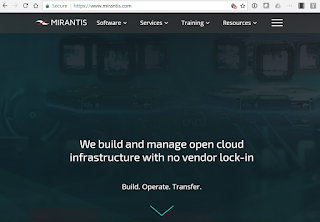Mirantis has announced a series of NFV-focused updates to Mirantis Cloud Platform (MCP), optimised to facilitate deployment, operations and updates via DriveTrain and to support NFV for telecom operators, cable providers and enterprises.
The enhancements to Mirantis' MCP solution include:
1. OVS-DPDK over bonded interfaces, which allows users to consume higher bandwidth over a single link aggregated interface.
2. VLAN-aware VMs, enabling users to consume fewer vNICs, where previously a separate vNIC was required for each VLAN, thereby helping to reduce network complexity in virtualised environments.
 3. Per-VF QoS to offer support for bandwidth capping on a per-virtual-function level, permitting finer-grained traffic shaping and preventing 'noisy-neighbour' syndromes.
3. Per-VF QoS to offer support for bandwidth capping on a per-virtual-function level, permitting finer-grained traffic shaping and preventing 'noisy-neighbour' syndromes.
Mirantis stated that with MCP it is moving from the traditional software-centric method based on licensing and support subscriptions to offer an operations-centric approach, where open infrastructure is continuously delivered with an operations SLA via a managed service or by the end customer. This approach allows software updates to be introduced incrementally on a bi-weekly basis with no down time, rather than via major bi-annual or annual updates.
Launched in April, Mirantis Cloud Platform incorporates open source software such as OpenStack and Kubernetes, continuously delivered via the DriveTrain continuous integration/continuous delivery (CI/CD) pipeline and provided to customers in a build-operate-transfer delivery model designed to enable hybrid cloud operations at scale.
The MCP provides a single platform to orchestrate VMs, containers and bare metal compute resources through the inclusion of Kubernetes for container orchestration and supports virtual compute stacks complemented with open source software defined networking (SDN). It also features StackLight, enabling compliance to availability SLAs via continuous monitoring of the open cloud software stacks.
Mirantis' build-operate-transfer model provides customers with a turnkey experience, with Mirantis operating the cloud for a period of at least six months with up to four-nines SLA prior to offboarding operational responsibility to the customer, if required. This delivery model is designed to ensure that the customer's team and processes are aligned with devops best practices.







